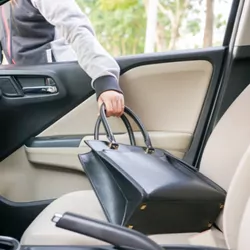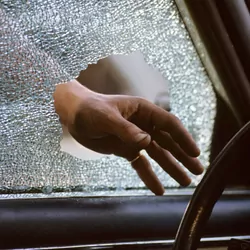
Chaged with Rogue and Vagabond? Here's what you need to know.
Most states refer to the theft of a motor vehicle or its contents as a burglary. In Maryland, however, this type of crime can result in what the state refers to as a rogue and vagabond charge. Despite its funny name, being charged with this theft crime is no laughing matter. In fact, a rogue and vagabond conviction can result in up to three years of imprisonment. Therefore, if you've been arrested on a rogue and vagabond charge, you should immediately contact an experienced criminal defense attorney for assistance.

What is Rogue and Vagabond in Maryland?
Section 6-206 of the Maryland Code defines the crime of rogue and vagabond. Under the statute, there are several ways to commit this crime. The first way to commit the crime of rogue and vagabond is to be found in possession of a burglar's tool while in the vicinity of a motor vehicle.
Under section Section 6-206(a), a person may not possess a burglar's tool while having the intent to use or allow the use of the tool in the commission of a crime involving the breaking and entering of a motor vehicle. The other way to commit a rogue and vagabond offense is to enter another's vehicle with the intent to commit a theft.
Specifically, under section Section 6-206(b), a person may not be in or on another's motor vehicle with the intent to commit theft of that motor vehicle or any property that is in or on the vehicle.
Rogue and Vagabond Penalties
Pursuant to Section 6-206(c) of the Maryland Code, a person who commits the crime of rogue and vagabond is guilty of a misdemeanor. In addition, a person who is found guilty of this offense can face a term of imprisonment of up to three years.
What Crimes Are Covered?

As discussed above, practically any crime that involves stealing a motor vehicle or its contents can result in a rogue and vagabond charge-including possessing a burglar's tool with the intent of breaking into a vehicle. In other words, a person can be considered a rogue and vagabond without successfully breaking into a vehicle. In fact, the mere act of possessing a burglar's tool while in the vicinity of a motor vehicle could potentially result in a criminal charge. Unfortunately, this broad legal standard often results in the arrest and prosecution of people based on weak, circumstantial evidence. It is for this reason that it is imperative to hire an attorney to fight your charges if you've been arrested on a rogue and vagabond charge.
Arrests in Rogue and Vagabond Cases
Arrests in cases involving car burglaries are often the result of a few different types of evidence, including:
-
Eyewitness identification: One type of evidence in rogue and vagabond cases is eyewitness identification. However, unlike some other types of crimes involving theft, car break-ins often take place at night, meaning that there usually aren't many people around to witness them.
-
Tracing stolen items: A more common way that the authorities find and arrest rogue and vagabond suspects is to locate stolen items and trace them back to a suspect. Of course, this method isn't foolproof, and the police sometimes target innocent people due to mistakes made during the tracing process.
-
Fingerprints and DNA evidence: Another type of evidence available to police in these types of cases are fingerprints and DNA technology. However, these types of crime-solving tactics are typically reserved for cases involving high-value thefts, meaning that they are rarely employed in most car burglary cases.
-
Statements: The most damaging piece of evidence to a suspect in a rogue and vagabond case is a statement made to the police. Police will often say anything to a suspect to obtain a confession, and innocent people are often pressured into admitting to crimes they didn't commit. Therefore, as a suspect in a crime, it is important to never speak to the police without first consulting with an experienced criminal defense attorney.
Fighting Rogue and Vagabond Charges

Rogue and vagabond charges are often based entirely on circumstantial evidence, and prosecutors know that these types of cases are hard to prove. Despite this, however, victims of car break-ins often put pressure on the state to pursue charges, meaning that few of these cases are dismissed, and many of them end up going all the way to trial. Luckily, due to the weak evidence typically available in these types of cases, criminal defense attorneys are often able to successfully defend their clients against rogue and vagabond charges.
Without legal representation, however, the state is often successful in prosecuting defendants charged with motor vehicle burglary. Unfortunately, as discussed above, a person convicted of the crime of rogue and vagabond faces a misdemeanor charge and a maximum sentence of up to three years imprisonment. Therefore, if you are facing a rogue and vagabond charge in Maryland, it is imperative that you seek legal counsel as soon as possible to ensure that your rights are protected.
Contact a Maryland Theft Attorney
If you are facing a rogue and vagabond charge in the state of Maryland, you need an experienced Maryland theft attorney on your side. At FrizWoods, our knowledgeable attorneys pride ourselves on our accessibility, experience, and commitment to our clients. In furtherance of this, we have a 24-hour attorney line that our clients may use to reach us day or night.
Attorneys Max Frizalone and Luke Woods understand what it takes to successfully defend rogue and vagabond charges in Maryland, and we will put our experience and knowledge to work for you when you come to us for assistance.
At FrizWoods, we will treat your case as our top priority as we fight vigorously to protect your legal rights. If you are ready to begin fighting your criminal charges, please contact us as soon as possible to schedule a free initial consultation with one of our talented Maryland theft attorneys.

